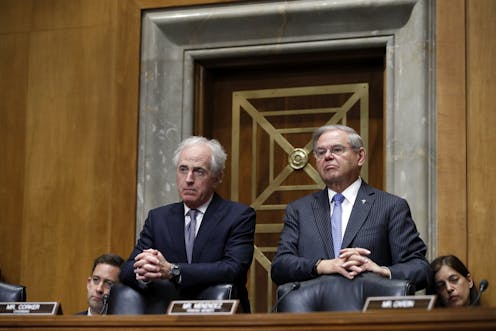Senate confirmation: The grilling can be grueling
- Written by Capri Cafaro, Executive in Residence, American University School of Public Affairs

President Donald Trump’s nominee to head the CIA is facing a confirmation battle[1] in the Senate. His nominee to Veterans Affairs, Ronny Jackson,[2] withdrew his controversial nomination before he even got to his confirmation hearing. And Mike Pompeo, Trump’s new Secretary of State, faced considerable Senate opposition[3] to his nomination.
Behind those battles lies the power of the president to nominate and the Senate to confirm candidates for more than 2,000 positions[4] – including ambassadors, federal judges and Cabinet secretaries.
The Senate’s confirmation role is a fundamental governmental function, embedded into the U.S. Constitution Article II, Section 2[5], that preserves the balance of power between the executive and legislative branches. Its job of “advice and consent” on presidential nominees[6] aims to limit to the power of any one person or branch of government.
Some nominees face significant scrutiny from U.S. senators who customarily grill prospective government officials in open committee hearings. The committee then votes whether or not to advance the nomination to a full Senate vote, though it may also not vote at all on a controversial nominee.
Almost all nominees survive the confirmation process. Just a handful are forced to withdraw from consideration or come up short when put to a vote. According to the Congressional Research Service, 99 percent of nominees are approved[7].
Rejected by the Senate
But there have been exceptions. In 1987, Ronald Reagan famously nominated Robert Bork[8] to the U.S. Supreme Court.
Bork’s controversial conservative views[9] on a number of legal matters, including privacy and civil rights, drew criticism from a number of senators who relentlessly questioned Bork. His nomination was defeated by the U.S. Senate 58 to 42[10].
While some are rejected by the Senate based on their policy positions, others fail to gain Senate support due to personal scandal.
George H.W. Bush’s pick for secretary of Defense, John Tower, faced questions about excessive drinking and alleged philandering[11] in 1989. Tower, a former U.S. senator from Texas, could not get enough votes from his former colleagues to be confirmed[12].
Forced to withdraw
Some nominees choose to withdraw from consideration.
Bill Clinton’s nominee for attorney general, Zoe Baird[13], dropped out after reports that she had not paid taxes on wages for her domestic help. Former U.S. Sen. Tom Daschle[14], President Obama’s original pick for Health and Human Services secretary, also withdrew his name from consideration due to tax problems.
But not every grilling is meant to derail a nomination.
As part of their role, senators may ask hard questions in order to get the nominee on the record[15] about his or her positions that may not yet be public. That way, they can hold the nominee accountable once they’ve been confirmed.
This article has been updated to reflect the withdrawal of Veterans Affairs nominee Ronny Jackson and the confirmation of Mike Pompeo as Secretary of State.
References
- ^ nominee to head the CIA is facing a confirmation battle (www.nbcchicago.com)
- ^ His nominee to Veterans Affairs, Ronny Jackson, (www.nytimes.com)
- ^ Mike Pompeo, Trump’s new Secretary of State, faced considerable Senate opposition (www.marketwatch.com)
- ^ to confirm candidates for more than 2,000 positions (fas.org)
- ^ Article II, Section 2 (www.law.cornell.edu)
- ^ “advice and consent” on presidential nominees (www.senate.gov)
- ^ According to the Congressional Research Service, 99 percent of nominees are approved (fas.org)
- ^ Ronald Reagan famously nominated Robert Bork (www.npr.org)
- ^ Bork’s controversial conservative views (www.reuters.com)
- ^ His nomination was defeated by the U.S. Senate 58 to 42 (www.nytimes.com)
- ^ excessive drinking and alleged philandering (www.nbcnews.com)
- ^ could not get enough votes from his former colleagues to be confirmed (www.nytimes.com)
- ^ Zoe Baird (www.nytimes.com)
- ^ Tom Daschle (www.cnn.com)
- ^ may ask hard questions in order to get the nominee on the record (www.law360.com)
Authors: Capri Cafaro, Executive in Residence, American University School of Public Affairs
Read more http://theconversation.com/senate-confirmation-the-grilling-can-be-grueling-95565

